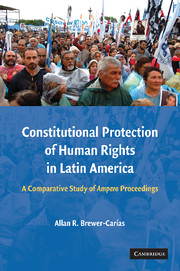 Constitutional Protection of Human Rights in Latin America
Constitutional Protection of Human Rights in Latin America Book contents
- Frontmatter
- Contents
- INTRODUCTION
- PART ONE THE CONSTITUTIONAL AND INTERNATIONAL DECLARATION OF HUMAN RIGHTS AND ITS JUDICIAL GUARANTIES
- PART TWO THE AMPARO AS A LATIN AMERICAN CONSTITUTIONAL AND INTERNATIONAL LAW INSTITUTION
- Chapter Three Judicial Review and Amparo Proceedings in Latin America
- Chapter Four The Amparo Action in Countries That Apply Only the Diffuse Method of Judicial Review of Legislation
- Chapter Five The Amparo Action in Countries that Apply Only the Concentrated Method of Judicial Review of Legislation
- Chapter Six The Amparo as a Constitutional Right in Countries with Mixed Systems of Judicial Review of Legislation
- Chapter Seven The Amparo as a Constitutional Guaranty in Countries with Mixed Systems of Judicial Review of Legislation
- Chapter Eight The American Convention on Human Rights and the Internationalization of the Amparo in Latin America
- PART THREE THE INJURED PARTY AND THE CONSTITUTIONAL RIGHTS PROTECTED BY MEANS OF THE AMPARO PROCEEDING
- PART FOUR THE INJURY, THE INJURING PARTY AND THE INJURING ACTS OR OMISSIONS IN THE AMPARO PROCEEDING
- PART FIVE THE EXTRAORDINARY CHARACTER OF THE AMPARO PROCEEDING
- CONCLUSION
- APPENDIX A List of Latin American Constitutions
- APPENDIX B List of Latin American Amparo Laws (Statutes)
- INDEX
Chapter Three - Judicial Review and Amparo Proceedings in Latin America
Published online by Cambridge University Press: 08 August 2009
- Frontmatter
- Contents
- INTRODUCTION
- PART ONE THE CONSTITUTIONAL AND INTERNATIONAL DECLARATION OF HUMAN RIGHTS AND ITS JUDICIAL GUARANTIES
- PART TWO THE AMPARO AS A LATIN AMERICAN CONSTITUTIONAL AND INTERNATIONAL LAW INSTITUTION
- Chapter Three Judicial Review and Amparo Proceedings in Latin America
- Chapter Four The Amparo Action in Countries That Apply Only the Diffuse Method of Judicial Review of Legislation
- Chapter Five The Amparo Action in Countries that Apply Only the Concentrated Method of Judicial Review of Legislation
- Chapter Six The Amparo as a Constitutional Right in Countries with Mixed Systems of Judicial Review of Legislation
- Chapter Seven The Amparo as a Constitutional Guaranty in Countries with Mixed Systems of Judicial Review of Legislation
- Chapter Eight The American Convention on Human Rights and the Internationalization of the Amparo in Latin America
- PART THREE THE INJURED PARTY AND THE CONSTITUTIONAL RIGHTS PROTECTED BY MEANS OF THE AMPARO PROCEEDING
- PART FOUR THE INJURY, THE INJURING PARTY AND THE INJURING ACTS OR OMISSIONS IN THE AMPARO PROCEEDING
- PART FIVE THE EXTRAORDINARY CHARACTER OF THE AMPARO PROCEEDING
- CONCLUSION
- APPENDIX A List of Latin American Constitutions
- APPENDIX B List of Latin American Amparo Laws (Statutes)
- INDEX
Summary
In addition to the purpose of protecting constitutional rights, the amparo action, as a specific judicial mean for protection, can also be considered in itself, particularly when exercised against State acts and actions, as a judicial mean for reviewing their constitutionality. So, in Latin American countries, a close relationship exists between amparo and judicial review, the latter as the power of the courts to control the conformity of State acts, particularly of legislative acts, with the constitution.
This power has also been developed in Latin America since the nineteenth century, imposing the need to study the amparo action, as it is established in the Latin American countries, within the general context of the judicial review systems.
Judicial review is only possible in countries having written constitutions, as is the case in all Latin American countries, which as a superior law imposes limits on the state organs' activities and in particular, on the Parliament; and of course, above all, in countries with an autonomous and independent Judiciary capable of controlling the constitutionality of State acts, precisely as a consequence of the limits imposed on State organs that cannot be considered sovereign entities.
This submission to the constitution has resulted in the establishment not only of “Administrative Jurisdictions” for judicial review of administrative action, but also of “Constitutional Jurisdictions” set forth in order to control the submission of the State organs, particularly the legislative bodies, to the superior law of the country, that is, to exercise judicial review of constitutionality of statutes.
- Type
- Chapter
- Information
- Constitutional Protection of Human Rights in Latin AmericaA Comparative Study of Amparo Proceedings, pp. 87 - 91Publisher: Cambridge University PressPrint publication year: 2008


